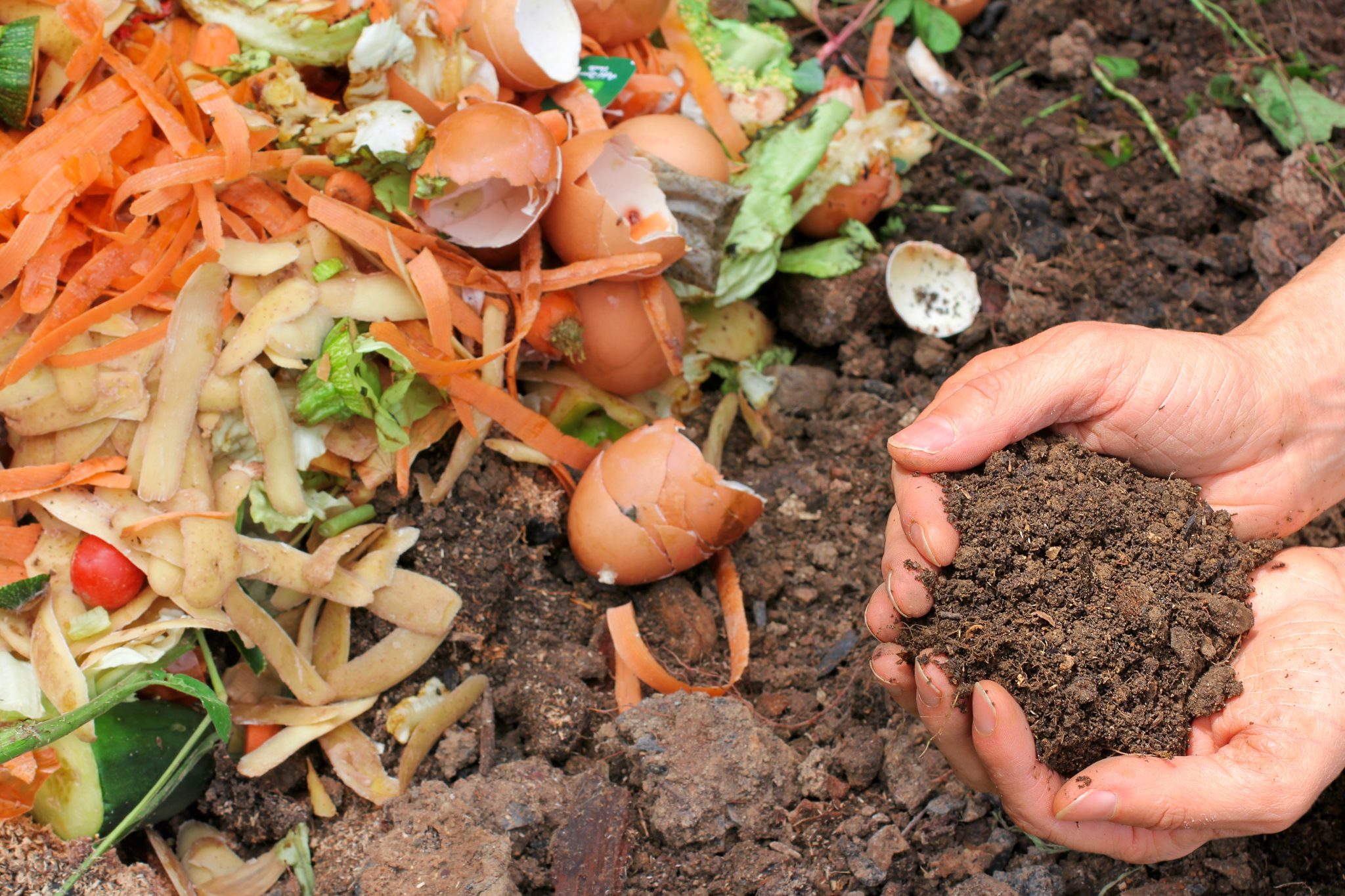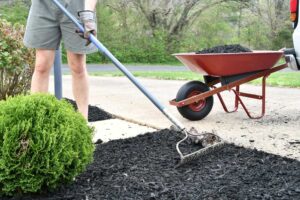Most people know compost as broken-down organic material turned back into soil through the use of sun, water, air and plenty of time. But did you know that compost is more nutrient-rich than typical soils and has many additional benefits?
The process of transforming food scraps into nutrient-dense soil can take as little as six to eight weeks. However, this depends on the season, climate and method of composting. Typical methods for composting vary depending on the space available, but are usually divided into two categories: small and large-scale composting methods.
Large-scale composting typically involves industrial facilities, while small-scale methods can be done at home through various backyard composting methods.
Reasons why your business needs compost
Compost reduces the amount of trash output in your community. It also serves as an asset to any property, construction site or business.
Here are 6 ways that compost can serve as a helpful addition to any property:
1. Prevents Soil Erosion
According to research conducted by Iowa State University, compost is an effective tool in reducing erosion and runoff on highway construction sites.
The research focused on the area on the side of the highway where the ground slopes down, and where conventional erosion prevention practices are typically used. The team at Iowa State used a rainfall simulator and three different types of compost to prove that compost can prevent erosion at highway construction sites by 30 percent.
In longer-term situations, the nutrient-dense composition of compost creates fertile ground for a healthy vegetation cover. The root establishment of the vegetation grown in the compost prevents erosion. Erosion relies on elements such as loose, infertile soil and heavy rains or runoff, so using healthy soil that encourages growth can be an effective preventative or erosion reduction tool.
2. Assists in Stormwater Management
Compost is a useful tool as part of a larger stormwater management strategy on any commercial property or construction site. As compost has the unique ability to retain a large volume of water, it is an excellent tool when it comes to slowing down and infiltrating excessive or unplanned amounts of water on any property.
Common stormwater management practices include green roofs and vegetated filter strips. Green roofs are roofs covered with vegetation that enable rainfall infiltration. This prevents rainfall from falling off the roof and collecting in unwanted places. Vegetated filter strips are dense areas of vegetation where rainfall is directed. Similar to green roofs, vegetated filter strips collect excessive rainfall.
In addition to diverting rainfall, these strategies often prevent pollutants from reaching rivers, lakes, or other bodies of water by absorbing contaminated runoff before it reaches them.
Compost has the capability to assist as part of both strategies.
3. Conserves Water
For businesses in areas prone to a dry season or that commonly experience drought, compost is an effective material for water retention. According to research conducted by Michigan State University, compost increases water holding capacity of soil by 2.5 times.
This ability to infiltrate and hold large amounts of water comes in handy during dry seasons, as compost ensures that more soil is maintained on the site for productive use. In this case, productive use refers to the absorption of nearby plants.
Additionally, compost’s high water retention capabilities allow water to be transferred laterally within the soil, further promoting hydration.
4. Breaks Down Pollutants
It is common, especially on current or former industrial properties, for contaminants to accidentally leach into the soil. In recent years, a new practice called compost bioremediation takes advantage of the natural microorganisms in compost that help turn food scraps into compost in the first place.
The compost is used to eliminate soil contaminants. To do this, the microorganisms in compost digest the contaminants. They’re turned into common byproducts of soil such as carbon dioxide, salt, and water. Many studies, including this one by Kastner and Miltner, have concluded that the soil is left healthier than it was found.
In extreme cases, the compost used can be altered to tackle specific contaminants, such as leached gasoline. For smaller cases, however, most compost can tackle common pollutants and absorb offending odors.
5. Promotes Soil Enrichment
Compost is rich in nutrients, and therefore can enrich soil on any property. When it’s added, compost gives the soil a boost of vital nutrients like nitrogen, phosphorus, and potassium, making the soil healthier and increasing its capability for future nutrient retention.
Compost also balances the pH and density of the soil and suppresses pests and diseases just by bringing a healthy nutrient balance to the table. Having the correct balance of nutrients allows soil to do its job of resisting disease, pests, and discouraging unwanted weeds.
Additionally, adding compost to the soil adds natural bulk, which has the potential to restore the soil structure and richness to its initial state before the use of chemical fertilizers.
6. Reduces Project Maintenance Costs
As mentioned above, compost promotes healthy soil through the delivery and refreshment of nutrients to the soil already on the property, conserves water, and can act as an effective piece in a stormwater management plan.
Therefore, costs are reduced or better yet, eliminated, for the replacement costs of plants that might otherwise die, and limits the need for the implementation of artificial irrigation systems. Compost also reduces the need for artificial fertilizers.
Since compost naturally repels weeds, the use of compost on a property reduces artificial repellants, such as weedkiller, that are an added expense and can harm plants that are wanted on the property.
Examples of successful commercial compost use
Erosion Control
The Texas Department of Transportation has used compost to control erosion from steep slopes.
Landscaping
Compost is commonly used as a component in landscaping. However, a particularly notable situation where compost played a major role was in the 1973 remodeling of the Constitutional Gardens in Washington, D.C. The garden’s original soil was determined to be undernourished and unusable. The fix, compost, was able to help transform the garden into the landmark it is today.
Green Roof
The Pace School in Pittsburgh, Pennsylvania used compost to create their school’s rooftop garden. Compost was necessary for the project due to the specific needs that the garden required, including the ability to withstand freezing temperatures, survive rainstorms and provide adequate nutrition for plans.
Those looking to utilize the many benefits of compost for their business or commercial facility might be thinking…now what? Well, Texas Disposal Systems has you covered with a variety of compost-related services, whether you’re looking to process your own organic material, or purchase compost for your business.
TDS offers compost processing services for any sized client, ranging from small organizations to entire communities. One of the few compost producers in Texas that is STA Certified (Seal of Testing Assurance), TDS holds up to the rigorous testing standards held by the USCC (United States Composting Council) to ensure that it’s producing top quality compost.
Additionally, Garden-Ville, an affiliate of TDS, offers a variety of options for purchasing compost, including Elite Lawn, made from Class A biosolids, and Eco Thrive, a nutrient rich, general purpose compost. Lawn Dressing, made from Class A biosolid compost filtered down to small sized particles, is also available for those looking to promote lawn health.




